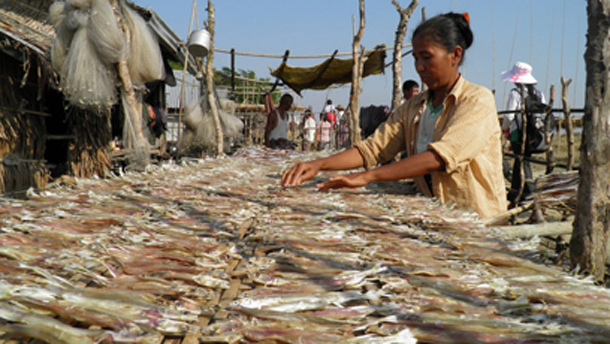Three local villagers who were involved in protests against the bidding process in issuing permits to fish farming cooperatives in the Pathein (Bassein) District of Irrawaddy Division have been sued by the township’s Department of Fisheries (DoF) for abusing the Freshwater Fisheries Act.
Tun Tun Moe, Kyaw Gyi and Soe Tint are accused of illegally entering and fishing in a lake occupied by the Shar Khae Gyi Fish Breeding and Production Facility in Pathein’s Kyonepyaw Township in May. Hundreds of other locals reportedly went fishing at the site to protest against what they say is a “rigged” bidding process.
“I’m confused as to why we’re being sued, because I am not a fishermen nor am I involved in the fisheries business,” said Kyaw Gyi. “We only helped the villagers because they asked us to be their representatives and to help submit their appeal to the authorities.”
He said they could now face up to two years imprisonment or a fine of 5,000 kyat (US $5.80) or both. However, he said, the plaintiffs did not show up to court for Tuesday’s hearing, so proceedings have been postponed until Nov. 6.
In fact, the three men also stand accused of being fugitives from the law despite the fact that they maintain they attended the court hearing while legal counsel for the DoF did not.
“We turned up, and now we are are the ones who are accused of being fugitives,” said Kyaw Gyi. “Although the protest took place five months ago, we did not hear that we were being sued until just a fews days ago when we received a summons dated Oct. 10.
“This system of justice is very disappointing. We want true justice,” he said. “In the meantime, we are not going anywhere.”
Other Shar Khae Gyi residents said they believed that the lawsuit against the three men is a step by the local authorities to prevent further protests in the area following a recent incident in which two people were killed when police opened fire on demonstrators.
“If they genuinely wanted to sue [the protesters’ representatives], they would have done it right after the protests in May,” said a local fisherman. “We believe that they [the DoF] have waited until now because they want to set an example to prevent further protests and clashes.”
Two people were killed and two others were seriously injured when police opened fire into a crowd in late September as they demonstrated to demand justice for their fellow villager Ko Talote (aka Win Naing) who was allegedly beaten to death by workers from the nearby Wine Wine Lae Cooperation fish farming business.
It is reported that the township authorities are soon to issue warrants for eight workers suspected of killing Ko Talote.
Tensions in Shar Khae Gyi have been high since May when more than 100 residents from surrounding villages protested against the Township Department of Fisheries’ bidding procedure for permits to utilize Shar Khae Gyi Lake. Local fishermen claimed the process was unfair as they would lose their right to fish and so also their livelihoods.
Bidding was postponed at that time and locals were assured that they would have the same rights as the private companies. Finally, Wine Wine Lae Cooperation won a permit to use Shar Khae Gyi for fishing, breeding and production.
Unconfirmed reports have been aired that several other villagers have been killed in the past months as violence escalated between locals and the fish farmers’ cooperative.
Ayeyar Shwewar Company, reportedly owned by Aung Thet Mann, a son of Lower House of Parliament Speaker Shwe Mann, formerly owned the fish-farming business which was contracted at the lake from 1998 until 2011.
According to local sources, the company used Burmese troops from Kyone Pyaw Township-based Battalion 36 to take care of security and stop locals fishing in the area. Soldiers frequently fired shots to scare away trespassers while those caught were reportedly beaten severely.
Before 1998, local fishermen and fish farmers were taxed by the Ministry of Cooperatives to fish in the 78 square-mile lake. But since then, Shar Khae Gyi has come under the control of the DoF which allocated permits by holding auctions with private fishery companies.















